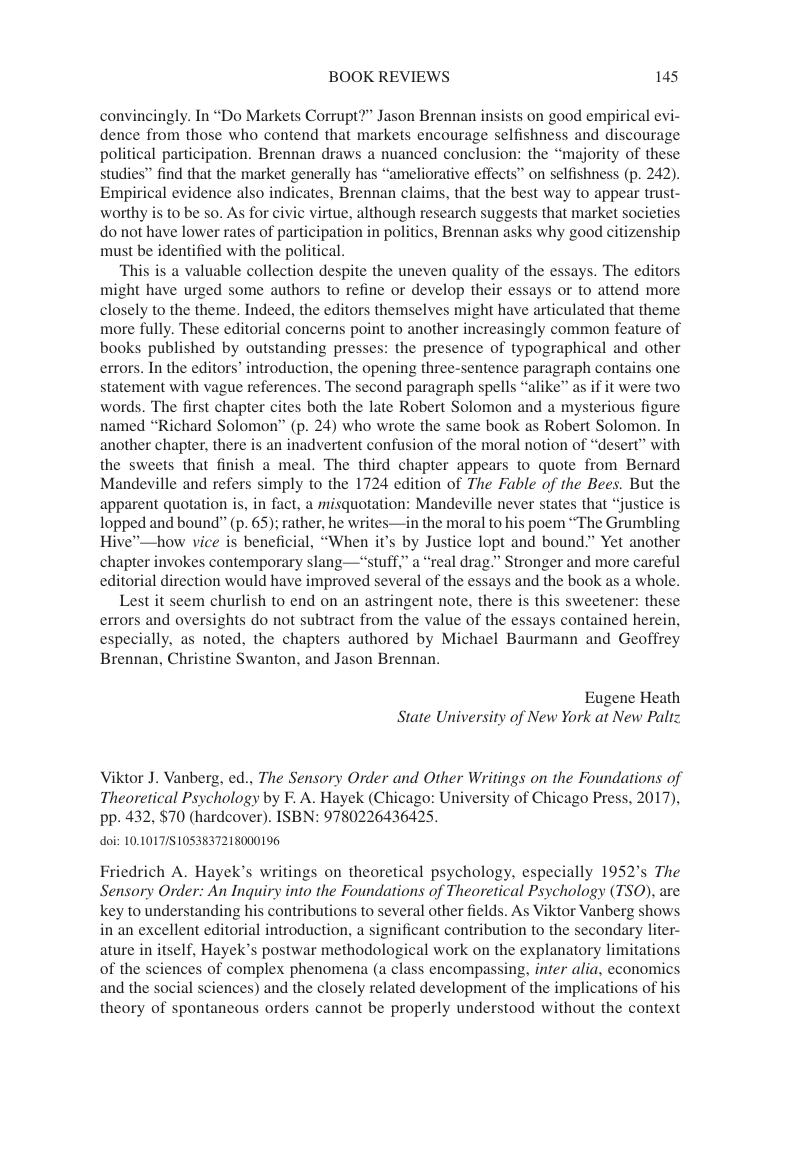No CrossRef data available.
Article contents
Viktor J. Vanberg, ed., The Sensory Order and Other Writings on the Foundations of Theoretical Psychology by F. A. Hayek (Chicago: University of Chicago Press, 2017), pp. 432, $70 (hardcover). ISBN: 9780226436425.
Review products
Viktor J. Vanberg, ed., The Sensory Order and Other Writings on the Foundations of Theoretical Psychology by F. A. Hayek (Chicago: University of Chicago Press, 2017), pp. 432, $70 (hardcover). ISBN: 9780226436425.
Published online by Cambridge University Press: 07 February 2019
Abstract
An abstract is not available for this content so a preview has been provided. Please use the Get access link above for information on how to access this content.

- Type
- Book Reviews
- Information
- Copyright
- Copyright © The History of Economics Society 2019
References
REFERENCES
Boettke, Peter. 2015. “The Methodology of Austrian Economics as a Sophisticated, Rather than Naïve, Philosophy of Economics.” Journal of the History of Economic Thought 37 (1): 79–85.CrossRefGoogle Scholar
Boring, Edwin G. 1942. Sensation and Perception in the History of Experimental Psychology. New York: D. Appleton-Century.Google Scholar
Friedman, Jeffrey. 2013. “Hayek’s Two Epistemologies and the Paradoxes of His Thought.” Critical Review 25 (3–4): 277–304.CrossRefGoogle Scholar
Hayek, Friedrich A. [1969] 2014. “The Primacy of the Abstract.” In The Collected Works of F.A. Hayek. Volume 15: The Market and Other Orders, edited by Caldwell, B. J.. Chicago: University of Chicago Press, pp. 314–317.Google Scholar
Hayek, Friedrich A. 1987. “Interview with Leo Rosten.” Retrieved from https://ia801407.us.archive.org/18/items/nobelprizewinnin00haye/nobelprizewinnin00haye.pdf. Accessed 9 October 2018.Google Scholar
Hayek, Friedrich A. 2006. Die Sensorische Ordnung: Eine Untersuchung der Grudlagen der Theoretischen Psychologie. Translated by Streit, Manfred. Tübingen: Mohr Siebeck.Google Scholar
Hutchison, Terence W. 1981. The Politics and Philosophy of Economics: Marxians, Keynesians, and Austrians. Oxford: Blackwell.Google Scholar
Scheall, Scott. 2015a. “Hayek the Apriorist?” Journal of the History of Economic Thought 37 (1): 87–110.CrossRefGoogle Scholar
Scheall, Scott. 2015b. “A Hayekian Explanation of Hayek’s ‘Epistemic Turn’.” Economic Thought 4 (2): 32–47.Google Scholar
Scheall, Scott. 2016. “A Brief Note Concerning Hayek’s Non-Standard Conception of Knowledge.” The Review of Austrian Economics 29 (2): 205–210.CrossRefGoogle Scholar
Scheall, Scott. 2017. “What Is Extreme about Mises’s Extreme Apriorism?” Journal of Economic Methodology 24 (3): 226–249.CrossRefGoogle Scholar
Weimer, Walter. 1982. “Hayek’s Approach to the Problems of Complex Phenomena: An Introduction to the Theoretical Psychology of The Sensory Order.” In Weimer, W. B. and Palermo, D. A., eds., Cognition and the Symbolic Processes. Volume 2. Hillsdale, NJ: Lawrence Erlbaum, pp. 241–285.Google Scholar
Zanotti, Gabriel, and Cachanosky, Nicolas. 2015. “Implications of Machlup’s Interpretation of Mises’s Epistemology.” Journal of the History of Economic Thought 37: 111–138.CrossRefGoogle Scholar


